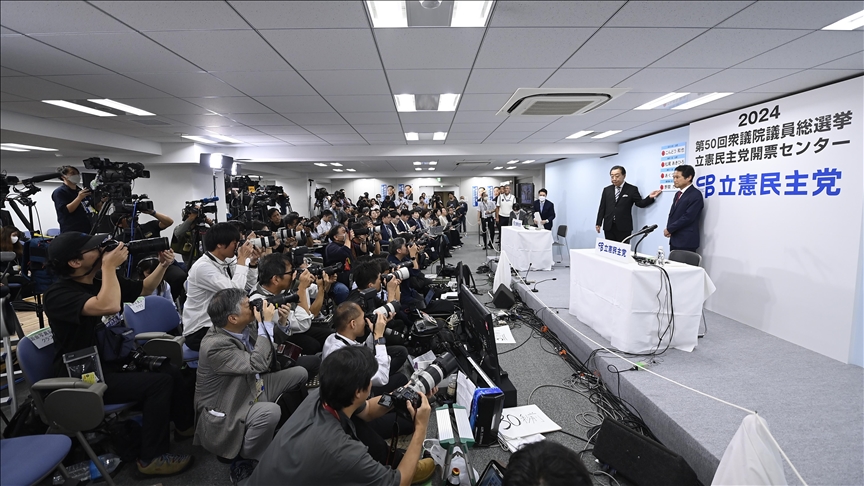Japan’s ruling coalition suffers historic setback, losing majority in parliament
Coalition of Liberal Democratic Party and Komeito fails to secure simple majority of 233 seats for 1st time since 2009
 Yoshihiko Noda (L), head of the main opposition Constitutional Democratic Party of Japan, is seen posing for photograph as he places a mark on an Party candidate's name, to indicate a victory in the general election, at the party's headquarters in Tokyo, Japan, on Sunday, October 27, 2024.
Yoshihiko Noda (L), head of the main opposition Constitutional Democratic Party of Japan, is seen posing for photograph as he places a mark on an Party candidate's name, to indicate a victory in the general election, at the party's headquarters in Tokyo, Japan, on Sunday, October 27, 2024.
ISTANBUL
Japan's ruling coalition suffered an historic setback Sunday, losing its parliamentary majority for the first time since 2009.
Snap elections were held 26 days after the Liberal Democratic Party (LDP) and its coalition partner Komeito elected Shigeru Ishiba as Japan's 102nd prime minister, according to Tokyo-based Kyodo News.
The final results reported by public-broadcaster NHK showed a dramatic realignment of Japanese politics. The LDP and Komeito won a combined 215 seats, or 191 and 24 seats respectively, well short of the 233 needed for a majority in the 465-seat lower house.
The main opposition Constitutional Democratic Party of Japan (CDPJ) made significant gains with 148 seats.
The Japan Innovation Party emerged as the third-largest party with 38 seats, followed by the Democratic Party for the People with 28 seats. Smaller parties including Reiwa Shinsengumi, with nine seats, the Japanese Communist Party, with eight seats and others divided the remaining seats, with independents claiming 12.
Notably, Reiwa Shinsengumi has maintained a pro-Palestine stance in and outside parliament.
The outcome marked a notable shift in Japanese politics, ending the LDP's unbroken dominance in parliament since 2009.
Calling the loss of its majority in parliament the “biggest blow,” Ishiba admitted that the LDP failed to grasp the public mood over a political funds scandal that plagued the ruling party.
He acknowledged that the voting results “indicate a difficult situation for his party.”
More than 45,000 polling stations were set up nationwide for the approximately 105 million eligible voters.
However, voter turnout is expected to be around 53%, about 2.8% lower than the previous election.
More than 1,300 candidates are competing for the 465 seats, including 289 in single-seat constituencies and 176 under proportional representation.
Ishiba, who took office on Oct. 1, pledged to address inflation and bolster Japan’s defense capabilities. But the LDP faced challenges amid public scrutiny over recent funding scandals.








